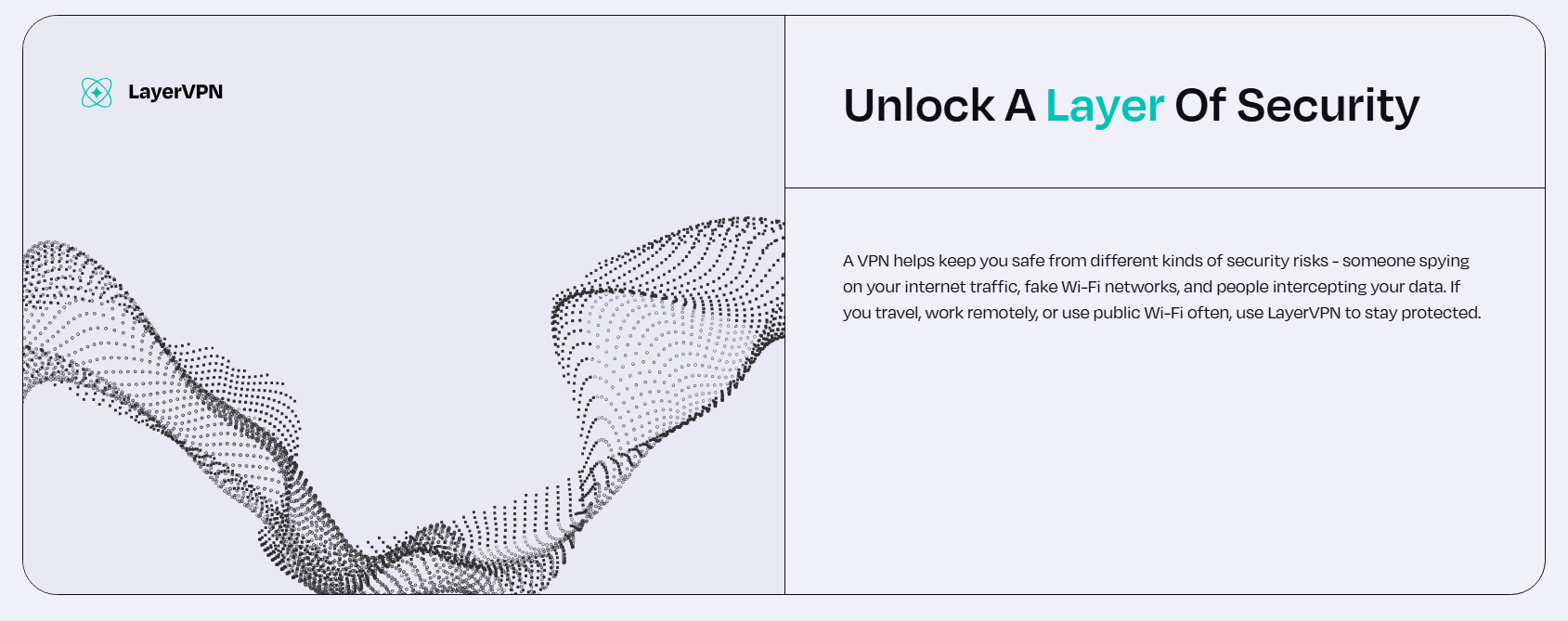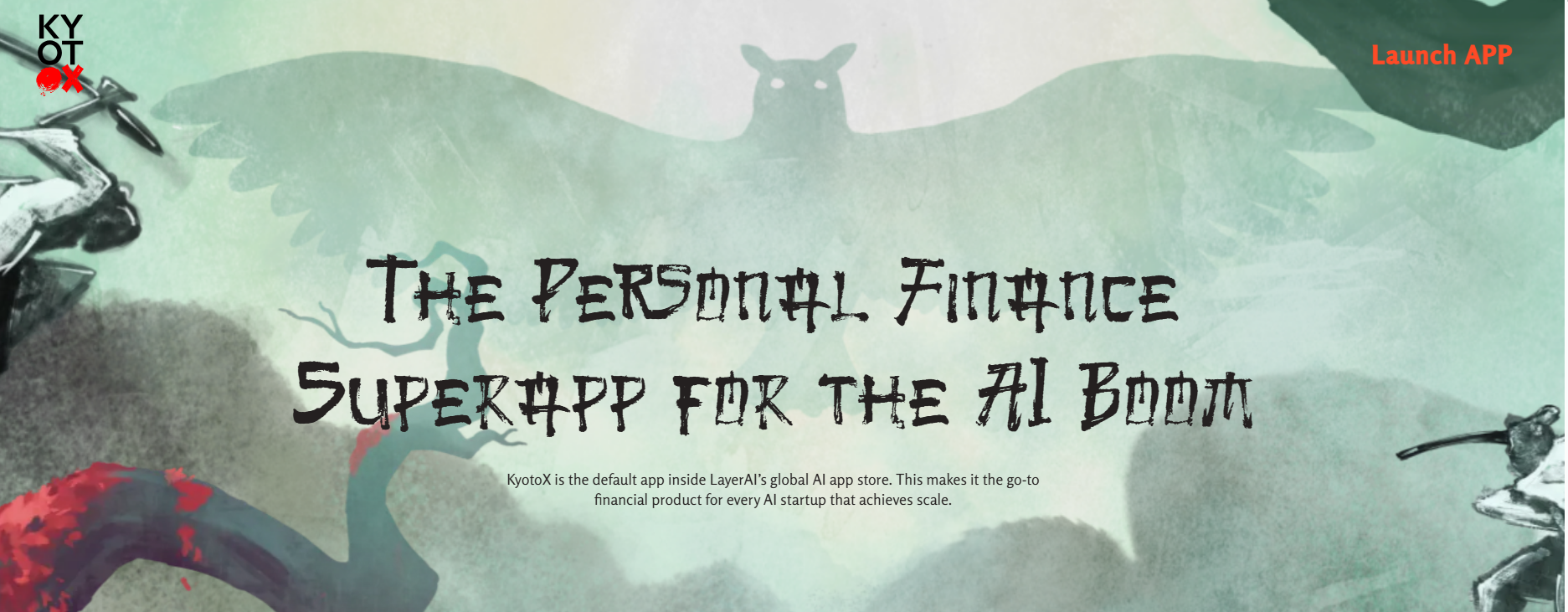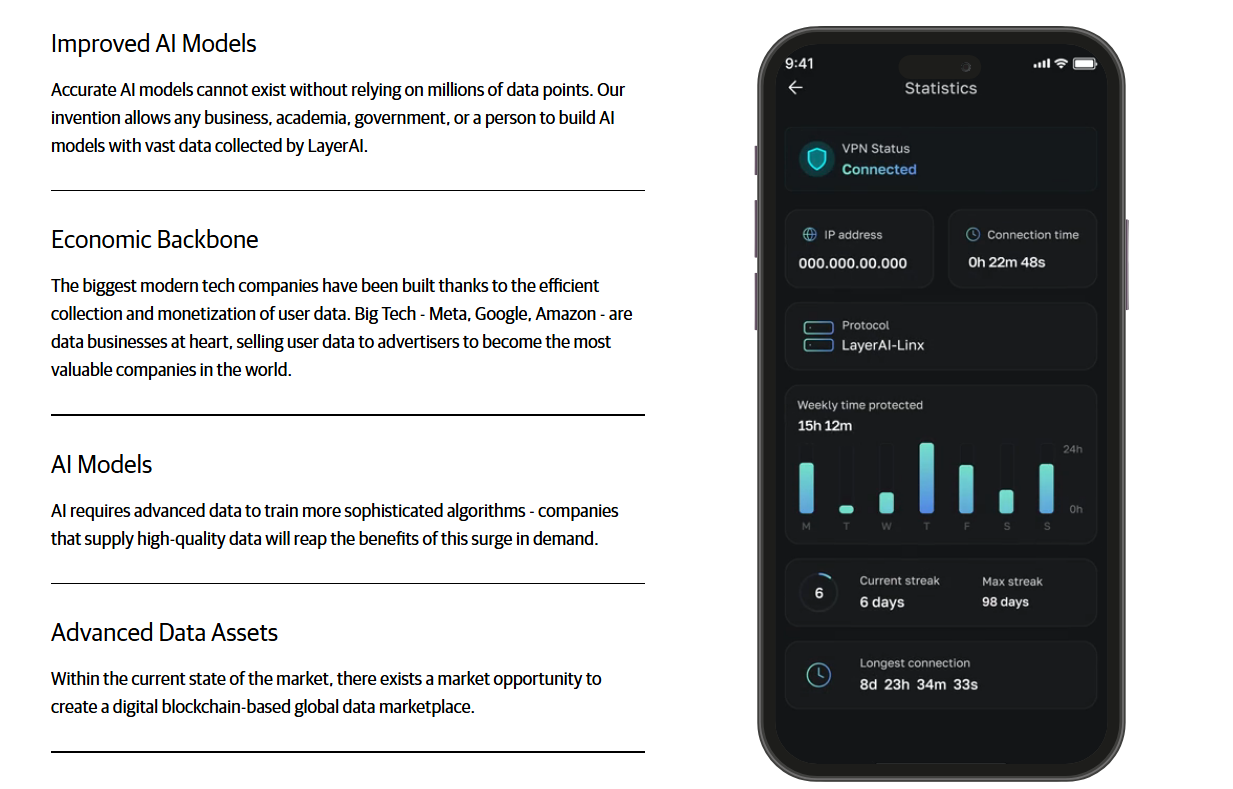LayerAIの技術アーキテクチャ
このモジュールでは、zkRollupテクノロジーの技術的な実装と、LayerAIでのPolygonのChain Development Kit(CDK)との統合について詳しく説明し、これらの革新が拡張性、セキュリティ、および運用効率を向上させる方法を詳細に説明します。
LayerAIにおけるzkRollup技術

LayerAIのブロックチェーンインフラはzkRollup技術に基づいて構築されており、拡張性、セキュリティ、効率を向上させることで知られている高度なLayer-2ソリューションです。zkRollupsにより、LayerAIは従来のブロックチェーンアーキテクチャの制限、例えば高い取引コストや遅い処理スピードに対処しながら、AIによって使用されるデータ集約型アプリケーションに特に適したアプローチでEthereumメインネットの分散性を維持しています。
zkRollup 技術は、トランザクションをオフチェーンで集約し、ゼロ知識証明を使用して検証し、これらのトランザクションの圧縮表現を Ethereum ブロックチェーンに送信することで機能します。このメカニズムにより、zkRollups は Ethereum メインネットワーク上の計算およびストレージの負荷を軽減し、トランザクションスループットを劇的に増加させることができます。LayerAI にとって、これは効率的に数百万のトランザクションを処理できるため、マイクロトランザクションに依存するデータのモノタイズ化および AI ドリブンのオペレーションに理想的であることを意味します。
zkRollupsは、正確なトランザクションのみがブロックチェーンに追加されることを保証し、エコシステムにセキュリティの利点をもたらします。これにより、外部パーティに対する信頼が不要になり、悪意のある行為者に関連するリスクが軽減されます。ロールアップはユーザーがオンラインに残る必要がないため、アクセシビリティが向上し、LayerAIのミッションであるユーザーフレンドリーな分散型プラットフォームの創造に合致します。
LayerAIのzkRollup実装は、Ethereum Virtual Machine(EVM)との互換性をさらに強化しており、これにより開発者は既存のスマートコントラクトを最小限の修正でLayerAIのLayer-2インフラストラクチャに展開することができ、開発者にとっての参入障壁を下げ、多様な分散型アプリケーション(dApps)がシームレスにそのエコシステムと統合することを可能にしています。この互換性により、開発者は馴染みのあるツールやフレームワークを使用してLayerAIのプラットフォーム上で開発することで、イノベーションを促進することもできます。
Polygonの統合
LayerAIは、実行信頼性とスケーラビリティの両方を向上させるために、PolygonのChain Development Kit(CDK)をインフラストラクチャに戦略的に統合しました。これは、プラットフォームがデータの収益化とAIイニシアチブをサポートする効率的なエコシステムを作成するために、実証済みのブロックチェーン技術と提携することに対するコミットメントを反映しています。
Polygonは、Ethereumのスケーラビリティを向上させるために設計されたブロックチェーンプロトコルであり、Ethereumメインネットの高い取引コストと限られたスループットに対処するレイヤー2のソリューションを提供しています。そのエコシステムには、サイドチェーン、zkRollups、楽観的なロールアップなど、さまざまなスケーリングメカニズムが含まれており、すべてがより高速かつコスト効果の高いブロックチェーントランザクションを提供することを目指しています。Polygonのソリューションは、高いパフォーマンスと相互運用性で広く認識されており、スケーラビリティを犠牲にすることなく、LayerAIのようなプロジェクトにとって好ましい選択肢となっています。
チェーン開発キット(CDK)は、Polygonの主要な提供物の1つであり、カスタムレイヤー2チェーンの展開を簡素化するモジュラーオープンソースのブロックチェーンスタックを提供しています。CDKを使用すると、開発者は特定のユースケースに合わせてカスタマイズされたブロックチェーンエコシステムを構築できます。同時に、Ethereumのセキュリティと分散アーキテクチャの恩恵を受けることができます。キットには、コンセンサスメカニズム、データの利用可能性、トランザクションの検証のためのコンポーネントが含まれており、プロジェクトは必要に応じてネットワークを構成できます。
LayerAIのPolygon CDKの採用により、データ集約型の操作に最適化されたゼロ知識(ZK)駆動のLayer-2チェーンを展開することが可能となりました。CDKの活用により、LayerAIは高度なzkRollup技術をブロックチェーンインフラストラクチャに統合することができ、トランザクションが効率的かつ安全に処理されることが保証されます。この統合により、LayerAIはPolygonの繁栄するエコシステムにアクセスでき、開発者、ツール、および相互運用性とイノベーションを向上させるアプリケーションの広範なネットワークを利用できます。
Polygonが基礎パートナーとして機能している一方、LayerAIの技術はPolygonに限定されず、他のブロックチェーンエコシステムにも適応できることを強調することが重要です。
多くの他のチェーンが、拡張性とパフォーマンスを向上させるために類似のzkRollupベースの技術を探求し、採用しています。これには、StarkNetやzkSyncなどの注目すべきプラットフォームが含まれており、彼ら自身のゼロ知識証明メカニズムを開発しています。また、zkRollupsをインフラストラクチャに統合している他のLayer-1およびLayer-2チェーンもあります。
LayerVPN

LayerVPNは、LayerAIの重要なコンポーネントであり、仮想プライベートネットワーク(VPN)とプラットフォーム内のノードとして機能するように設計されています。LayerVPNを通じてデータを貢献するユーザーは、分散型データ交換を直接可能にし、ネットワークの強靱性を高めます。ノードとして機能することで、LayerVPNは安全なデータ転送を容易にし、参加者に対して貢献に対する報酬を提供します。この機能により、データのプライバシーと分散化が密接に結びつき、新興データ経済におけるユーザーの力を高めるLayerAIのミッションと一致しています。
ノード機能を超えて、LayerVPNはデータプライバシーを求めるユーザーに実用的な利益をもたらします。従来のVPNは、ユーザーのアクティビティを記録する可能性がある集中型サーバーに頼っていることがよくあります。LayerVPNは、分散型フレームワーク内で動作することにより、データの投稿がプライベートかつ暗号化された状態で保持されることを保証し、この懸念を排除します。これにより、ネットワーク内での信頼が高まり、LayerAIのより広範な目標である安全でユーザー主導のデータ交換環境の構築をサポートします。

京都X

KyotoXは、LayerAIの分散型取引所およびレンディングプラットフォームであり、AIに特化したプロジェクトに合わせて設計されています。これにより、参加者は流動性プールやレンディングプロトコルなどの分散型ファイナンス(DeFi)ツールにアクセスできるようになり、AI開発者やデータ貢献者に金融的な機会を提供します。また、このプラットフォームはトークン化されたプロジェクトの資金調達も容易にしており、AIイニシアチブは伝統的な資本市場に依存せずにLayerAIエコシステムから直接リソースを確保することができます。
KyotoXはAIの革新と金融インフラを統合しています。これにより、LayerAIエコシステム内で資産の交換をサポートし、データとAIプロジェクトの開発をインセンティブ化しています。開発者やユーザーはKyotoXを介して金融機能にアクセスし、LayerAIのzkRollupアーキテクチャによって可能になるコスト削減と高速トランザクションの恩恵を受けることができます。これにより、DeFiとAIを組み合わせることで、エコシステムが革新的なプロジェクトをサポートする能力が強化されます。
Layer Marketplace

レイヤーマーケットプレイスは、参加者がデータカプセルNFTを作成、取引、収益化できるNFTベースのプラットフォームです。これらのカプセルは、トークン化されたユーザー生成データを表し、コントリビューターがデータをパッケージ化して、AI 開発者などの消費者に直接販売できるようにします。LayerAIは、データ資産のための分散型マーケットプレイスを作成することで、ユーザーが中央集権的なプラットフォームに依存することなく、独自の条件でデータ経済に参加できるようにします。
Layer MarketplaceはAIとブロックチェーンの統合のためのイノベーションハブとしても機能します。 開発者は、AIモデルトレーニングやその他のアプリケーションを促進するためにData Capsule NFTを購入できます。 倫理的かつ同意に基づくデータの使用を促進します。 この取引モデルにより、貢献者が公正に補償され、同時にAIプロジェクトに高品質なデータが提供されます。 Layer Marketplaceは、データを取引可能な資産クラスとして捉えるLayerAIのビジョンを具現化し、1兆ドル規模のグローバルデータ経済への貢献を行っています。
LayerAIアプリ

LayerAIアプリは、エコシステムへのゲートウェイとして機能し、ユーザーがその機能を利用して報酬を得ることを可能にします。アプリを通じて、ユーザーはデータカプセルNFTを購入、売却、管理し、自身のデータの収益化に貢献することができます。また、アプリはLayerVPNとKyotoXへのアクセスを提供し、データ経済やDeFi活動に参加するための統一されたインターフェースをユーザーに提供します。
アプリのユーザーセントリックなデザインは、LayerAIのアクセシビリティとエンゲージメントに焦点を当てています。これにより、データの収益化プロセスが簡素化され、技術的な専門知識のレベルが異なる個人もエコシステムに参加できるようになります。アプリの報酬メカニズムはユーザーの活動を奨励し、LayerAIの成長と採用を促進します。機能性と使いやすさを組み合わせることで、LayerAIアプリはプラットフォームの分散型アーキテクチャの中心的なコンポーネントとして機能します。
ハイライト
- LayerAIは、スケーラビリティを向上させ、Ethereumメインネットの取引コストを削減するためにzkRollup技術を採用しています。
- zkRollupsはトランザクションをオフチェーンで集約し、効率的な処理のためにゼロ知識証明で検証します。
- 強化されたセキュリティにより、外部の信頼に頼らずにリスクを軽減し、有効なトランザクションのみがブロックチェーンに追加されます。
- EVM互換性により、分散型アプリケーションのシームレスな統合と開発者への障壁の低下が実現されます。
- PolygonのCDKを使用することで、LayerAIはカスタムLayer-2ブロックチェーンを構築でき、Ethereumのセキュリティと拡張性の恩恵を受けることができます。
- Polygonとの協力により、実証済みのエコシステムにアクセスでき、イノベーションと運用の信頼性が向上します。





